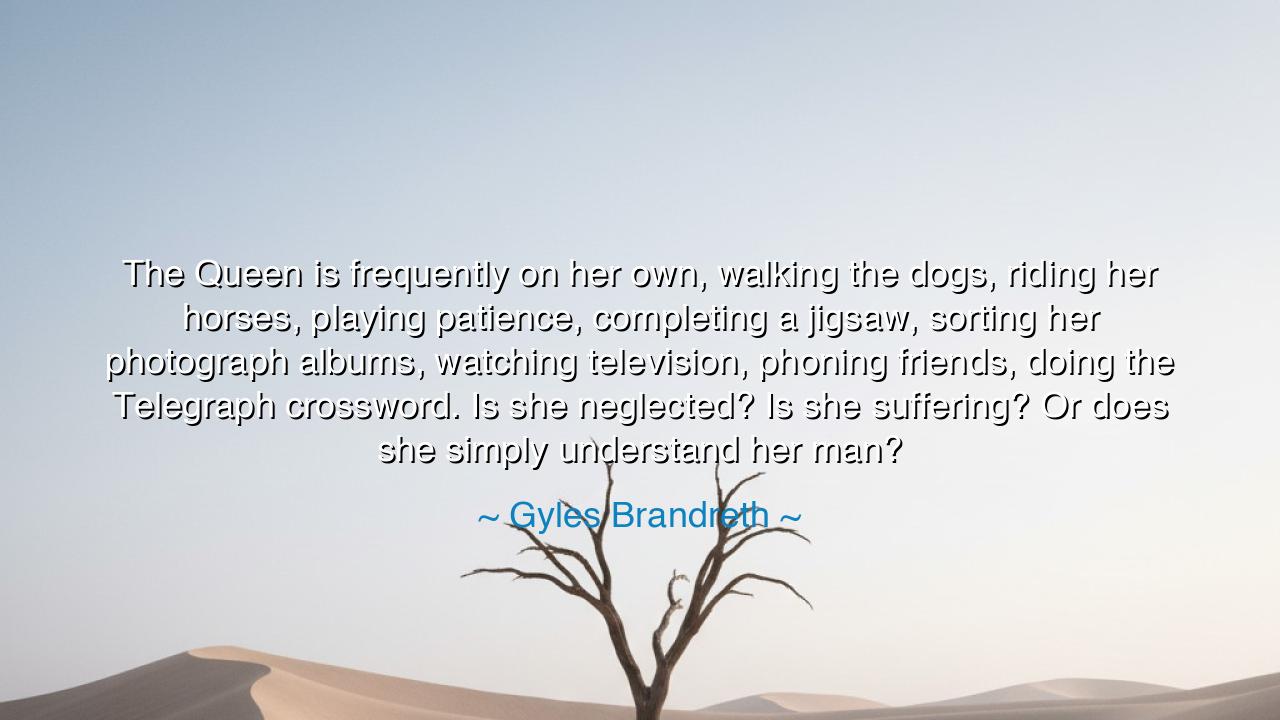
The Queen is frequently on her own, walking the dogs, riding her
The Queen is frequently on her own, walking the dogs, riding her horses, playing patience, completing a jigsaw, sorting her photograph albums, watching television, phoning friends, doing the Telegraph crossword. Is she neglected? Is she suffering? Or does she simply understand her man?






Hear the words of Gyles Brandreth, chronicler of lives lived under the crown, who observed of Elizabeth II: “The Queen is frequently on her own, walking the dogs, riding her horses, playing patience, completing a jigsaw, sorting her photograph albums, watching television, phoning friends, doing the Telegraph crossword. Is she neglected? Is she suffering? Or does she simply understand her man?” These words are no idle reflection but a window into the mystery of endurance within marriage, duty, and solitude. For in the stillness of her daily life, the Queen is revealed not as a figure abandoned, but as a woman who has learned the strength of understanding.
The origin of this saying lies in Brandreth’s reflections on the long union between Elizabeth II and Prince Philip, a marriage that spanned more than seven decades. He, restless, vigorous, and often brusque; she, steady, enduring, and devoted to her role as sovereign. Their relationship was not marked by constant companionship, but by a balance between distance and trust. The Queen, often left to her solitary pursuits, did not see herself as forsaken. Rather, she embraced the truth that love is not always clinging, but often a patient giving of space.
Consider the image: a monarch, ruler of realms, sitting quietly with a jigsaw puzzle or crossword. These simple acts, far removed from the pomp of palaces, show us that even the highest of figures must learn the art of filling solitude with peace. The question Brandreth raises—is she suffering, or does she simply understand her man?—is the question of every partnership, every marriage: do we measure love by constant presence, or by the deeper fidelity that allows both closeness and distance?
History offers us parallels. Think of Abigail Adams, wife of John Adams, the second president of the United States. For long years, she was left alone on their farm in Massachusetts while her husband served abroad in diplomacy and later in government. She could have despaired in her solitude, but instead she filled her time with study, correspondence, and the raising of her children. Her letters reveal not a woman abandoned, but one who understood her man, who believed that her patience and independence were part of her contribution to his calling.
The wisdom here is profound: true companionship is not measured by the hours spent side by side, but by the strength of mutual understanding. The Queen’s solitude was not neglect but partnership, for she knew her husband’s restless need for action, and he knew her steadfast endurance. In this balance lay their union’s longevity. So too must we learn that in love, there are seasons of closeness and seasons of apartness, and that endurance requires trust in both.
The lesson, then, is not only for kings and queens but for all who bind themselves in love or in friendship. Do not mistake solitude for sorrow, nor distance for neglect. Rather, ask whether the quiet is a sign of trust, a space given so that both souls may flourish. Learn to cherish the small rituals—the puzzle, the walk, the conversation with a friend—that make solitude fruitful rather than bitter. For in these, one finds not abandonment, but strength.
So I say to you, children of tomorrow: seek not a love that clings always, but a love that endures always. Be patient with the solitude of others, and patient with your own. Do not fear the silence between companions, but see in it the root of trust. For as Brandreth shows us through the Queen’s example, sometimes the deepest love is not in constant presence, but in the quiet wisdom of simply understanding your man. This is the secret of endurance, and the crown of fidelity.






AAdministratorAdministrator
Welcome, honored guests. Please leave a comment, we will respond soon